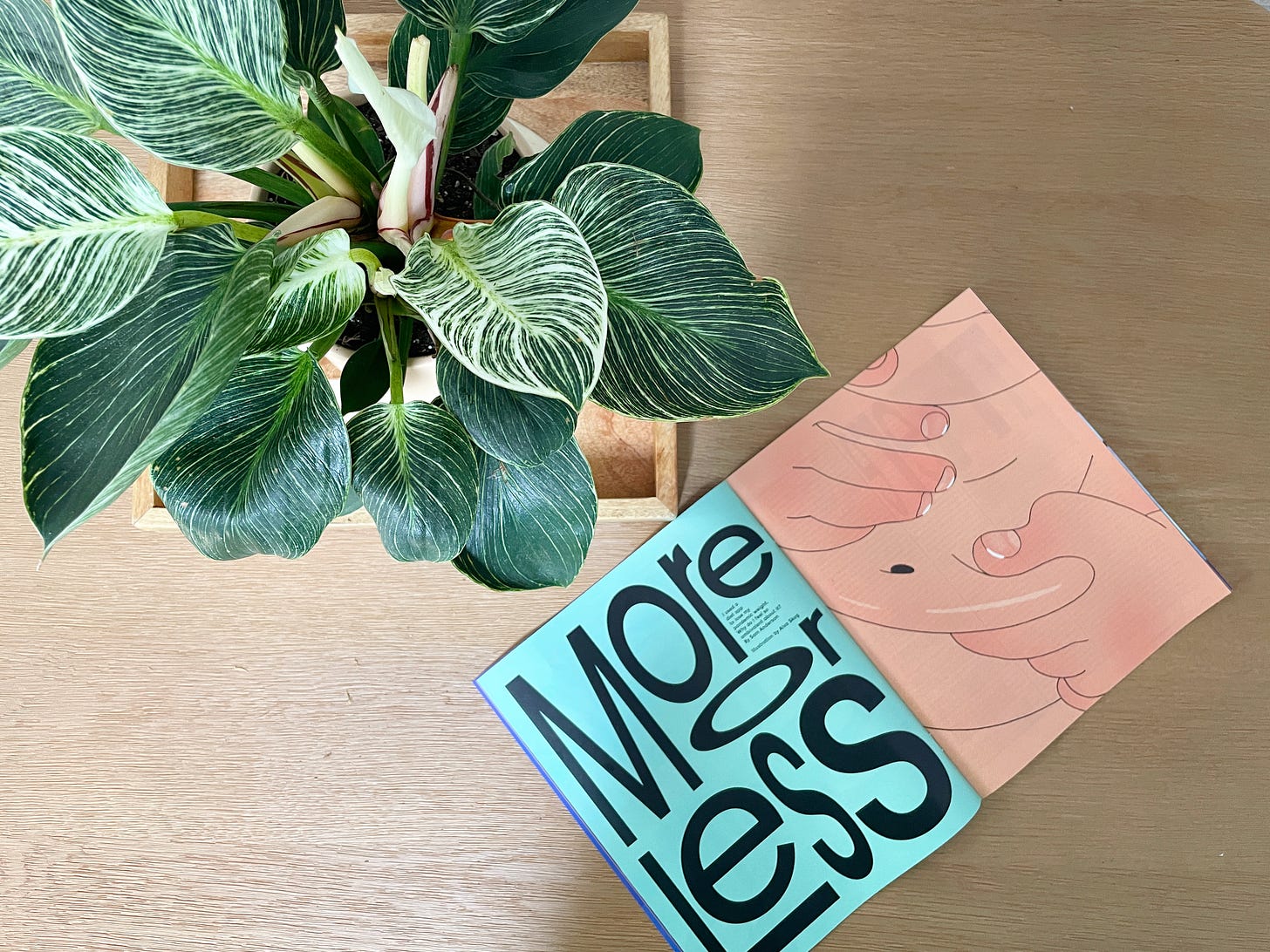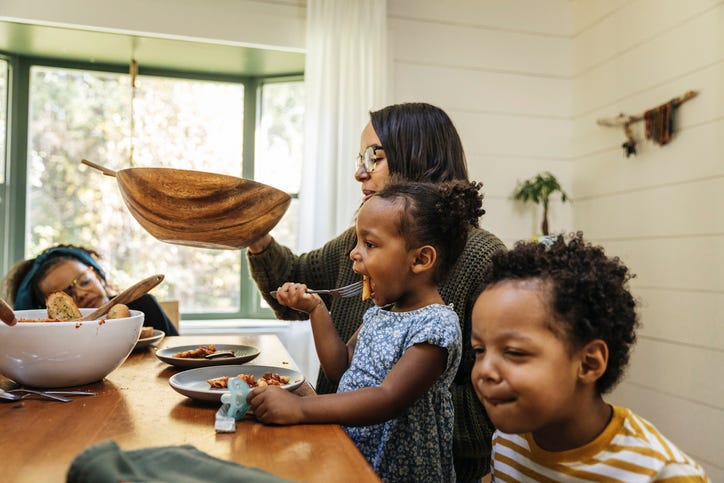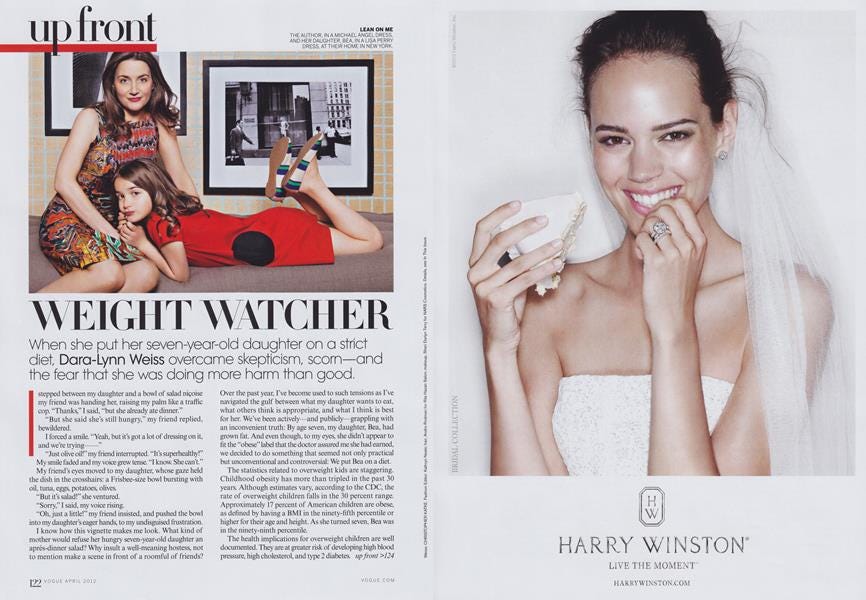The Cautionary Tales of Vogue Mom and Fat Sam
Fearing our appetites, fearing ourselves.
Ten years ago, a writer in New York City named Dara Lynn Weiss became the most maligned mother on the Internet for a minute because she wrote a story for Vogue about putting her then-seven-year-old daughter, Betty Kubovy-Weiss, on a diet. In her subsequent book, The Heavy, Weiss wrote about canceling cupcakes and cooking vegetables without oil to get Betty’s caloric intake down—and about dieting right alongside her child. And she regretted the Vogue photoshoot, not only because it made Betty the face of a national conversation about childhood ob*sity, but also because the photographer chose “flattering poses” for her daughter (lying on her stomach or with a table covering her midsection). Translation: If we could have only seen just how fat Betty was, it would have made everything Weiss did okay.
Earlier this month, Betty, now a college student, did an “as told to” story with Today.com, where she defends and forgives her mother:
At a certain point, I had to decide: Am I going to be angry with my mom for the rest of my life, or am I going to try to understand her love? For my own sake, and for the sake of having a good relationship with my mother, I needed to find the logic and kindness in what she did.
It’s a complicated piece. Which it should be. Parents who put their children on diets can (and usually do) still love their children. Mothers who interrogate Starbucks baristas about hot chocolate calorie counts are not monsters. They are women who know the world. They want to protect their kids from the stigma and body agony they’ve lived through or witnessed. And they are perpetuating that same harm against their beloved kids. By pushing weight loss as a solution to body unhappiness, they reinforce that the world is right. “I come from a very normal family,” Betty says. She’s not wrong.
Last week, Sam Anderson wrote another complicated piece for the New York Times Magazine, about being a former fat kid, from another normal family:
Throughout my childhood, as I watched my mother gain and lose weight, as I tagged along to her weight-loss meetings and Jazzercise classes, I became fluent in the slogans of 1980s diet culture. No pain, no gain. A moment on the lips, a lifetime on the hips. Inside every fat person, there is a skinny person waiting to get out.
Anderson doesn’t blame his mother either. He writes that she had it even worse, as a woman with a fat-shaming father, and in doing so, downplays the harm of his own experiences being bullied at school and turned into a brownie-eating spectacle. “I’ve never struggled with an eating disorder, have never been grievously hurt by diet culture,” Anderson writes, before describing how his alter ego, Fat Sam, thinks all day about the bowl of Greek yogurt he now permits himself to have for breakfast.

Both of these stories are about former fat kids still trying, so hard, to get their bodies right. “I’m a body-positive advocate, first and foremost,” says Betty. “But I’m also taking a prescription medication to curb my appetite.” Fat Sam, meanwhile, has resorted to Noom to lose his pandemic weight. He doesn’t deny that Noom is a diet (as I also reported here and here). But he does claim that, “for whatever reason, shockingly, depressingly, triumphantly, problematically, Noom worked.” Importantly, he doesn’t say for how long and does later acknowledge the high failure rate of dieting. If Fat Sam wants to stay thin, he will have to restrict forever, and human biology makes that exceedingly difficult.
I want to be clear that this is not an essay about other people’s choices. It is hard to have a body, and it is harder to have a fat body, in a culture that tells us there is only one right way to have a body. Trying to rid ourselves of the appetites we blame for the bodies we hate is a perfectly human thing to do. I come from a very normal family, says Betty. Because normal families teach that appetites are wrong, dangerous, and not to be trusted. Taming that hunger, that wild unruliness, has been the goal for most of us for so long, that we can’t even see the premise we aren’t questioning. That premise—that thin bodies are more valuable than fat ones—is intertwined with how we understand what it means to be a loving parent, a good person. With how we understand love.
When Dara Lynn Weiss wrote that she wished the Vogue photographs hadn’t made Betty’s “after” body look so thin, she was asking us to understand the depth of her fear for her child. She was also saying something uncomfortable and true: We do expect parents of fat kids to control their children’s appetites and bodies. We don’t demonize them for banning sugar or second helpings. We just want them to do all that quietly, so we don’t have to look too closely. What reads as abusive and manipulative when it happens to thin kids is framed as a necessary part of “being a good mother” to a fat child.
Fat kids put on diets are supposed to be grateful someone is doing something about the problem of their bodies. Fat boys don’t get eating disorders, we think. (We are wrong.) They’re supposed to be able to take the joke, to enjoy the joke, to accept that they can only eat brownies when they are making a spectacle of themselves eating brownies for the thin kids’ amusement. Fat girls don’t get eating disorders, we think. (We are wrong.) They’re supposed to be grateful that someone is trying to make them thin, because thin equals pretty and desirable.
Fat kids put on diets have to navigate how food, hunger and love become both inextricably tangled together and yet can somehow only exist correctly in opposition to one another. They don’t get to exist in their bodies; they learn, instead, to think about their bodies in terms of how they look to other people, in terms of the emotions they elicit in adults when they are viewed at doctor’s appointments, or in family photos. And so instead of learning to trust their appetites or to celebrate the power and potential of their bodies just as they are, they learn to perpetually seek a different, better body. One that has never felt out of control around a cheeseburger. One that doesn’t crave. “Fat Sam didn’t care,” Anderson writes. “He just kept cramming the universe into his face.” But Fat Sam does care. Later in the piece, Anderson notes: “When I choose to deny myself something, it is Fat Sam who is feeding, greedily, on that denial.” Fat Sam is the raison d’etrat for Anderson’s restriction. He only exists because Anderson cannot allow himself to be fat.
What if we let fat kids be? What if they could take the same unbridled joy in their appetites that we let most thin kids experience for at least some, if not all, of childhood? When desire isn’t wrong, it loses its anxiety, its urgency. Hunger can be embraced, instead of feared. Love no longer feels conditional. And fat kids could stop dividing themselves into “befores” and “afters,” into flattering and unflattering photos, into fat bodies with skinny people trapped inside.

But that’s only possible if parents of fat kids—and actually all kids—reject the premise that goes unquestioned in both of these stories. If we reject the notion that fat is bad; if we reject the idea that our kids’ bodies can’t be trusted to grow; if we reject the premise that our worth as parents should be measured by our children’s weight—then diet culture has nothing to feast on. We need to identify diet culture as the enemy—not our kids’ bodies, not our own bodies, and not even other parents who are still caught up in trying to play this game by the rules. And then we need to make it safe for our kids to just be who they are.
Casey Johnston has more thoughts on “Fat Sam” and eating disorder denial.
I also appreciated this take from Anne Helen Petersen: Anderson’s piece is both beautifully written and deeply fatphobic. (And I think the beauty of the writing lulls a lot of us into not realizing just how anti-fat it is?)
If you’re worried about feeding your baby during this formula shortage, this account is full of good resources and information. Yummy Toddler Food also has you covered.

If you are also raging about the racist massacre in Buffalo: Sharon Hurley Hall is a must-read. (And here’s Jessica Valenti with a very useful roundup of more things to read).
And remember that gun reform is now a states issue. Everytown has a website that lets you see — state by state — what the laws are in each state. We know that electing new majorities in our target states will make it possible to pass gun safety legislation. The States Project helped flip Maine in 2018, and were able to deepen that new majority in 2020 — this was an outcome in their 2021 session. So this is, yet again, where the Burnt Toast Giving Circle can do some good. We’ll be picking the state to focus on in the next few weeks, but we need you with us!





My life- NY “social xray” mom. Everyone on my dad’s side is fat and avoiding that fate became my mom’s life’s mission (a failure - genetics and bone structure uber all). Among her last words to me from her deathbed were something about weight loss. And yet, “I come from a normal family.” And she meant more than well. She meant only the best. And it’s the worst trauma of my life, and even if I started therapy decades before I did, I don’t think I would ever fully heal. Thank you for this wonderful article, and as for the kids, good god, let them eat cake!
"By pushing weight loss as a solution to body unhappiness, they reinforce that the world is right." So good.